- Home
- Richard Lee Byers
The Haunted Lands: Book III - Unholy Page 21
The Haunted Lands: Book III - Unholy Read online
Page 21
When he judged it was time for a break—he didn’t need one, but a live man surely would have—his cap was full of copper with a sprinkling of silver mixed in, and his appreciative listeners were happy to drink with him. It was the latter he’d hoped to accomplish.
He offered tales and rumors to prompt them to do the same without feeling he was interrogating them. Gradually he drew out all they’d heard about the dungeons beneath Szass Tam’s castle and strange creatures roaming the slopes of the mountain on which their city sat.
So-Kehur crawled on the outer face of the gate at the west end of the bridge. The structure was a barbican sufficiently high and massive to discourage any attacker, but that didn’t necessarily mean every bit of stonework remained solid enough to withstand a pounding from the council’s artillery and magic. So far, though, that did indeed appear to be the case.
It occurred to him that, clambering around the heights with various limbs extended to anchor him, he must look rather like a metal spider. It likewise crossed his mind that some folk might think it beneath the dignity of the autharch of Anhaurz to make this inspection.
But he fancied that any first-rate commander would understand his desire to see for himself. Aoth Fezim would understand.
And speaking of the sellsword captain, the troops he led, and the archmages they served, where in the name of the Black Hand were they? So-Kehur swiveled his various eyes to gaze at the highway running north. No one was there but the common sort of traveler, and, as was often the case in the bleak new Thay that Szass Tam had made, not many of those.
So-Kehur shivered in frustration. Patience, he told himself, patience. It was good that the enemy army was advancing slowly. It gave him that much more time to prepare for the siege to come.
A voice called from overhead: “Milord?”
He looked up at the battlements. His aquiline face tattooed with jagged black lightning bolts, Chumed Shapret, his seneschal, was standing there, along with a sweaty, tired-looking soldier in dusty leather armor.
So-Kehur felt a pang of excitement, because Chumed’s companion was one of the scouts they’d sent forth to keep track of the council’s army. Apparently, intent on his examination of the higher reaches of the gate, he’d missed seeing the fellow arrive below him. He climbed toward his minions as fast as he could, and they each shrank back an involuntary step. Maybe they were afraid that in his haste, he’d close a set of serrated pincers on one of them or sweep them from their perch with a flailing tentacle.
If so, they needn’t have worried. He’d long since learned to handle a steel body better than he’d ever managed the form into which he’d been born. He swarmed over the parapet, retracted his various limbs to their shortest lengths, and the two soldiers dropped to their knees before him.
Though he generally enjoyed such deference, he was too eager to leave them that way for more than an instant. “Rise!” he said. “And tell me, when will the council arrive?”
The scout gave Chumed an uncertain look. “Tell him,” the officer said.
The scout shifted his eyes back to So-Kehur. “I don’t think they’re going to, Master. Arrive, I mean.”
“What are you talking about?” So-Kehur demanded.
“They swung around the city and headed south. They’re looking for another way to cross the river.”
So-Kehur told himself it couldn’t be true, but obviously, it could. It made perfect sense that even zulkirs and one of the most respected captains in the East would hesitate to attack the stronghold he’d made of Anhaurz, especially considering how much of their strength they’d already expended taking the Dread Ring.
So-Kehur felt dizzy, and the tall towers rising from the sides of the gate and at intervals down the length of the bridge seemed to mock him. He’d labored long and hard to create an invincible weapon and had succeeded all too well. The result of all his work would be to deny him the slaughter he so craved.
But no. It didn’t have to be that way. Not if he refused to allow it.
He turned his eyes on Chumed. “How soon can our troops be ready to march?”
Chumed blinked. “March, Milord?”
“Yes, march! We’ll head west a little way, then hook around to pin the invaders against the river.”
The seneschal hesitated. Then: “Master, naturally we would have defended the city had the enemy chosen to attack. That’s our duty. But unless I’m mistaken, we haven’t received any orders to go forth and engage the council elsewhere.”
“No other force as large as ours is close enough to do it, and anyway, I’m in authority here. Do you think the regent would have given me my position if he didn’t trust me—indeed, expect me—to show initiative?”
“Master, I’m sure Szass Tam has complete confidence in you. But in light of the powers the rogue zulkirs command, maybe it would still be prudent to consult him before you act. I mean, you’re a Red Wizard and have other mages under your command. Surely someone knows a way to communicate with High Thay quickly.”
Yes, surely. And if So-Kehur were to employ it, perhaps Szass Tam would opt to leave his old enemies unmolested in the hope they’d eventually leave Thay of their own volition. He never would have done so in the old days, but Szass Tam had changed since establishing the regency, and no one truly understood his priorities anymore.
Even if the lich did want the invaders pursued and destroyed, he might decide to dispatch a more seasoned general to command the effort, or even descend from the Thaymount to see to the task himself. So-Kehur could find himself consigned to a subordinate role or left behind to mind Anhaurz while the blood spilled elsewhere.
And all those possibilities were unacceptable.
He tried to frame an excuse to give Chumed, then suffered a spasm of irritation. He was thinking like the old So-Kehur, that plump, cringing, contemptible wretch. The new So-Kehur was a lord, and lords didn’t have to justify their decisions to their subordinates. Rather, they disciplined them when they were insolent.
Drawing on one of the peculiar talents he’d developed after abandoning the external attributes of humanity, he lashed out with his thoughts. Chumed cried out, staggered, and nearly reeled off the wall-walk before collapsing onto his side, where he writhed and bled from his chewed tongue and his nostrils. Though not the target, the scout too caught a bit of the effect. Crouching, face contorted, he clutched his forehead in both hands.
For a moment, So-Kehur remembered his long association with Muthoth and how the other young necromancer had liked to bully him. He felt both squeamish and pleased to at last be the bully himself, but of the two emotions, pleasure was by far the stronger.
He delivered only a few restrained blows to Chumed’s psyche; the seneschal was too useful a deputy to kill. Upon finishing, he said, “I trust we’re done with questions and second-guessing.”
Shaking, Chumed clambered to his knees. “Yes, Milord.”
“Then get our army ready.” Meanwhile, the artisans would transfer So-Kehur’s brain into a body specifically intended for the battlefield.
Mirror thought he heard something that might have been a footfall, the faint sound almost covered by the whistling of the cold mountain wind. Or perhaps he simply sensed the advent of trouble. Either way, he didn’t doubt his instincts. They’d saved him too many times, even if they hadn’t helped on the terrible day when Fastrin killed his body and dealt his soul the spiritual wounds that had never truly healed.
“Come on,” he whispered. He started toward an extrusion of basalt large enough to serve as cover, then saw that Bareris wasn’t following. The bard was still singing under his breath, still casting about with wide, black eyes and a dazed expression on his pallid face.
Even after centuries as a phantom, Mirror almost reached to grab his friend and drag him behind the rock before remembering that his hand would simply pass through Bareris’s body. Instead, he planted himself right in front of the bard and said, “Brother, come with me now.” Insofar as his sepulchral tone allowed, he i
nfused his voice with all the force of command that had once made younger warriors jump to obey.
Bareris blinked. “Yes. All right.” Mirror led him into the patch of shadow behind the basalt outcrop.
They scarcely had time to crouch before a dozen ghouls—hunched, withered, hairless things with mouths full of needle fangs—came loping down the trail. Szass Tam had plenty of patrols watching for signs of trouble, even this far down the mountain.
The creature in the lead—judging from the stomach-turning stench of it, it might be one of the especially nasty ghouls called ghasts—abruptly halted, raised its head, and sniffed, although how it could possibly smell anything but itself was a mystery. Mirror willed his sword into his hand. But then the ghast grunted and led its fellows on down the path.
Mirror waited for the patrol to trek farther away, then whispered, “It’s a good thing neither of us sweats.”
Bareris didn’t answer. That wasn’t unusual, but the reason was. Crooning to himself, he was already slipping back into his trance. He started to straighten up.
“Wait,” Mirror said. “Give the ghouls another moment.”
Bareris froze in a position that would have strained a living man.
“All right,” continued the ghost, “that should be long enough.”
Bareris finished rising and continued onward, straying from the trail as often as he walked on it, halting periodically to run his hand over a stone or a patch of earth. Prowling behind him, Mirror watched for danger and tried to believe this scheme might actually work.
He told himself he should believe. He had a century’s worth of reasons to trust Bareris, and even were it otherwise, faith had been the foundation of his martial order and his life. Still, his friend’s plan seemed like a long shot at best, partly because Mirror had never seen the bard do anything comparable before.
Rumor had it that the cellars of the Citadel connected to natural caverns below. Bareris reasoned that the caves might well let out somewhere on the mountainside, and Mirror agreed the notion was plausible.
It was his comrade’s strategy for finding an opening that roused his skepticism. Bareris had collected stories concerning killings and uncanny happenings on the slopes. Some of those tales were surely false or had become confused as they passed from one teller to the next. Even the ones that were accurate didn’t necessarily reflect the predations of creatures that emerged from the catacombs to hunt. The desolate peaks of the Thaymount were home to a great number of beasts likely to devour any lone hunter or prospector they happened across.
Still, Bareris had tossed all the dubious stories into his head like the ingredients of a stew. Somehow the mixture was supposed to cook down to a measure of truth, or perhaps a better word was inspiration. Then magic would lead the singer to the spot he needed to find.
Let it be so, Mirror silently prayed. I don’t know how it can be, but let it be so.
Day gave way to night. Light flickered on the northern horizon as, somewhere in that direction, a volcano belched fire and lava. The ground rumbled and shivered, and loose pebbles clattered down the slopes.
Some time after, Bareris abruptly halted and sang the brief phrase necessary to give his song some semblance of a proper conclusion. “We’re close.” His voice and expression were keen, purged of the dreamy quality the trance had imparted.
Mirror cast about. “I don’t see anything.”
“I don’t, either, but it’s here.” The slope above this narrow length of trail was steep enough that an ordinary man might well have hesitated to climb on it. But Bareris scuttled around on it quickly, with minimal concern for his own safety. Since a ghost couldn’t fall, Mirror tried to examine the least accessible places and spare his comrade at least that much danger.
Neither found anything.
Mirror looked down at the bard. “Should we go higher?” he asked. “Or investigate the slope beneath the trail?”
“No,” Bareris said. “It’s here. It’s right in front of us.”
Or else, Mirror thought, you simply want it to be. But what he said was, “Good enough.” They resumed picking over the same near-vertical stretch of escarpment they’d already checked.
Until Bareris said, “I found it.”
He was standing—or clinging—beside what appeared to be just another basalt outcropping. Mirror floated down to hover directly in front of him and still couldn’t see anything special about it. “You’re certain?” he asked.
“Yes. Last year or the year before, this stone was higher up the mountain. Then a tremor shook it loose, and it tumbled down here to jam in the outlet like a cork in a bottle. For a moment, I could see it happening.”
“Let’s find out what I can see,” Mirror said. He flew forward into the solid rock. For a phantom, it was like pushing through cobwebs.
Almost immediately, he emerged into empty air. A tunnel ran away before him, twisting into the heart of the mountain.
He turned, flowed back through the stone, and told Bareris he was right.
Bareris sang a charm. He vanished, then instantly reappeared. “Damn it,” he growled. “Even this far under the castle, I can’t shift myself inside.”
“But I can go in,” Mirror said. “I’ll explore the caves and find a second outlet. Then I’ll come back here and fetch you.”
Bareris shook his head. “If the stories are true, there are things lurking in the tunnels that could hurt even you. Things you might not be able to handle by yourself. Besides, what if there isn’t another opening, or we run out of time while you’re looking for it?”
“What’s the alternative?”
“Yank the stopper out of the jug.”
“I know you’re strong, but that stone is bigger than you are, and you don’t have any good place to plant your feet.”
That made it sound as if Mirror’s only worry was that the boulder wouldn’t pull free. In truth, he was equally concerned that it would, suddenly, and carry Bareris with it as it tumbled onward. The bard knew a spell to soften a fall, but it wouldn’t keep the rock from crushing, grinding, and tearing him to pieces against the mountainside.
“I can do it,” Bareris said, “or rather, we can. You’ll help me with your prayers.”
Mirror saw that, as usual, there was no dissuading him. So he nodded his assent, and while Bareris sang a song to augment his strength, Mirror asked his patron to favor the bard. For an instant, the god’s response warmed the cold, aching emptiness that was his essence even as the response manifested as a shimmer of golden light.
Still singing, Bareris positioned his feet on a small, uneven, somewhat horizontal spot unworthy of the term “ledge.” He twisted at the waist, found handholds on the boulder, gripped them, and started straining.
At first, nothing happened, and small wonder. Standing as he was, Bareris couldn’t even exert the full measure of his strength. Then the stone made a tiny grating sound. Then a louder one.
Then it jerked free, so abruptly that it threw Bareris off balance. The stone and the bard plummeted together, just as Mirror had envisioned.
For the first moment of the stone’s fall, Bareris was more or less on top of it. Its rotation would spin him underneath an instant later, but he didn’t wait for that to happen. He snatched at the mountainside, and his left hand closed on a lump of rock. He clung to it, and the boulder rolled on without him, bouncing and crashing to the floor of the gorge far below.
Mirror floated down to the place where Bareris dangled. “Are you all right?”
“Fine.” Bareris reached for another outcropping with his free hand, revealing the tattered inner surface of his leather gauntlet and the shredded skin and muscle beneath.
The tunnels were lava tubes or splits in the stone, produced by earthquake and orogeny. Unlike limestone caverns, they had no stalactites or stalagmites to hinder Bareris’s progress. But that was the only good thing about them. They were a maze of unpredictable twists and cul-de-sacs stretching on and on in the darkness, and, unsurprisi
ngly, the stories that had enabled him to locate the entrance were of no use at all when it came to finding his way inside. He’d sung a song to locate worked stone—specifically, whatever archway was closest—and it gave him a sense that the nearest such feature lay to the northeast. But that didn’t guarantee he’d be able to grope his way to it anytime soon.
Perhaps perceiving his impatience, Mirror said, “You could try to bring Aoth and the zulkirs to us now. They might know magic to guide us all through.”
“I thought of that,” Bareris replied. “But what if these caves don’t actually link up with the dungeons?”
“Then perhaps they can blast a way through.”
“Perhaps, but I imagine that would ruin any hope of taking Szass Tam by surprise.”
“by surprise.”
“by surprise.”
Startled, Bareris turned to Mirror and saw that the ghost, who currently resembled a smeared reflection of himself, looked just as surprised. He knew he hadn’t truly repeated himself nor spoken loud enough to raise echoes in the sizable cavern he and the phantom were traversing. Yet he had an eerie sense that something—or everything—had repeated, as if the world itself were stuttering.
He and Mirror had hiked a long way without encountering any of the long-buried perils for which these depths were infamous, but he suspected their luck had just run out. He drew his sword, and the ghost’s shadow-blade oozed outward from his fist. Pivoting, they looked for a threat. It might be difficult to spot. Too many fallen boulders littered the cave floor. Too many alcoves and tunnel mouths opened on blackness.
“Do anything? You see,” said Mirror, his voice rising at the end of the second word. “Bareris, I swear, I said that properly. Or at least, I didn’t feel that I was jumbling the words.”
“I believe you,” Bareris said.
“What’s happening to us?”

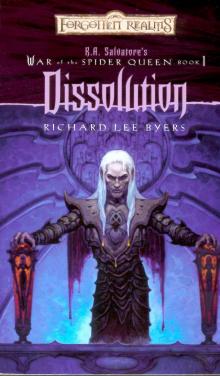 Dissolution
Dissolution Arkham Horror- Ire of the Void
Arkham Horror- Ire of the Void The Haunted Lands: Book II - Undead
The Haunted Lands: Book II - Undead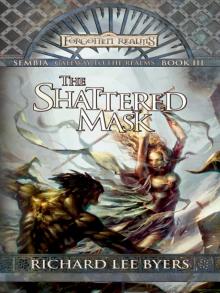 The Shattered Mask
The Shattered Mask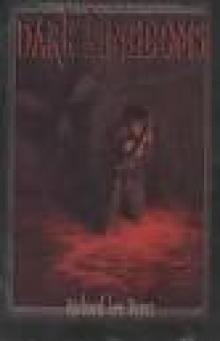 Dark Kingdoms
Dark Kingdoms The Masked Witches: Brotherhood of the Griffon, Book IV
The Masked Witches: Brotherhood of the Griffon, Book IV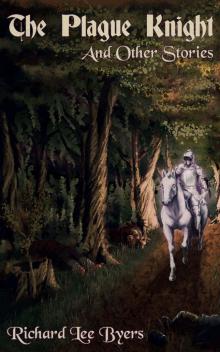 The Plague Knight and Other Stories
The Plague Knight and Other Stories Unclean: The Haunted Lands
Unclean: The Haunted Lands The Captive Flame: Brotherhood of the Griffon • Book 1
The Captive Flame: Brotherhood of the Griffon • Book 1 The Taste of Waterfruit and Other Stories (Story Portals)
The Taste of Waterfruit and Other Stories (Story Portals) The masked witches botg-4
The masked witches botg-4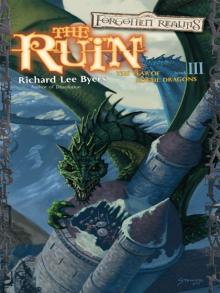 The Ruin
The Ruin The Spectral Blaze botg-3
The Spectral Blaze botg-3 The Masked Witches
The Masked Witches Blind God's bluff bf-1
Blind God's bluff bf-1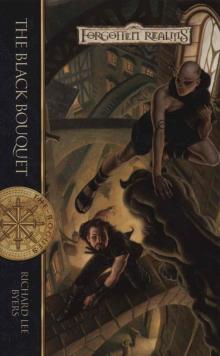 The Black Bouquet r-2
The Black Bouquet r-2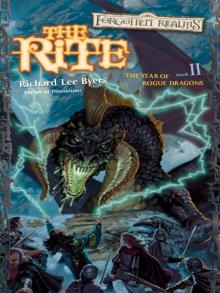 The Rite
The Rite Prophet of the Dead: Forgotten Realms
Prophet of the Dead: Forgotten Realms The Shattered Mask s-3
The Shattered Mask s-3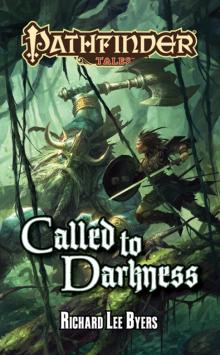 Called to Darkness
Called to Darkness Undead hl-2
Undead hl-2 Blind God's Bluff: A Billy Fox Novel
Blind God's Bluff: A Billy Fox Novel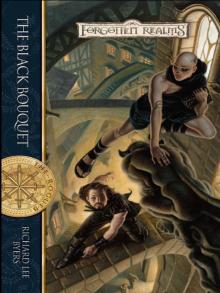 The Black Bouquet
The Black Bouquet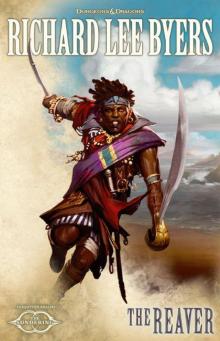 The Reaver
The Reaver The Spectral Blaze: A Forgotten Realms Novel
The Spectral Blaze: A Forgotten Realms Novel Queen of the Depths
Queen of the Depths Prophet of the Dead botg-5
Prophet of the Dead botg-5 Whisper of Venom: Brotherhood of the Griffon, Book II
Whisper of Venom: Brotherhood of the Griffon, Book II The Captive Flame botg-1
The Captive Flame botg-1 The Haunted Lands: Book III - Unholy
The Haunted Lands: Book III - Unholy Prophet of the Dead
Prophet of the Dead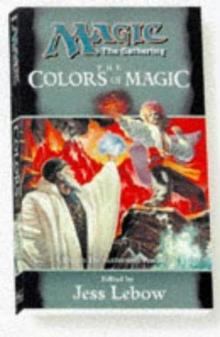 The Colors of Magic Anthology (magic: the gathering)
The Colors of Magic Anthology (magic: the gathering) Unholy hl-3
Unholy hl-3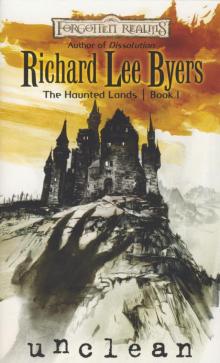 Unclean hl-1
Unclean hl-1 Blind God's Bluff
Blind God's Bluff Whisper of Venom botg-2
Whisper of Venom botg-2 The Spectral Blaze
The Spectral Blaze